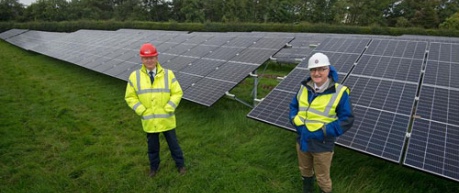Thursday 24th September 2020, 3:00pm
A solar farm that will play a vital role in helping the University of Edinburgh become carbon neutral by 2040 is nearing completion.

Almost 5000 ground-mounted panels are now being installed at Easter Bush campus in Midlothian in a move that will save an estimated £200,000 per year in electricity costs.
The five-hectare site – the equivalent of five football pitches – will be connected to the world-renowned Royal (Dick) School of Veterinary Studies and the Roslin Institute, with installation due to finish in November.
The solar farm – one of the first to be housed on a University campus – will provide 15 percent of the Easter Bush site’s electricity consumption.
Its photovoltaic (PV) panels are expected to generate more than 1,400,000 kWh of electricity a year, which is roughly the same as that needed to supply 500 typical homes. Together with existing generation capacity, 60 percent of Easter Bush’s electricity, and 30 percent of its heat, will be generated on site from low or zero-carbon technologies.
The Easter Bush development includes a ‘living laboratory’ for solar PV research, enabling researchers to investigate improved methods of generating green power.
"The University of Edinburgh has invested more than £20 million in low-carbon energy in recent years, which has reduced its overall CO2 emissions by almost 10,000 tonnes annually. The solar farm at Easter Bush will not only allow us to lead the way in the practical implementation of such technology, but research the next generation of low-carbon energy.”
Dave Gorman, Director of Social Responsibility and Sustainability, the University of EdinburghThe University of Edinburgh was an early adopter of PV technology. Its first panels were installed at its King’s Buildings campus in 2007 and have since generated nearly 1,000MWh.
In recent years, the University’s solar installations have generated an average of 265MWh of electricity annually. The new development will substantially increase that figure, to an average annual figure of 4,500 MWh, which will save more than 1,000 tonnes of carbon emissions each year.
Edinburgh’s ambition of becoming carbon neutral by 2040 represents one aspect of the University’s commitment to social and civic responsibility and to meeting the UN’s Sustainable Development Goals.
Source: The University of Edinburgh